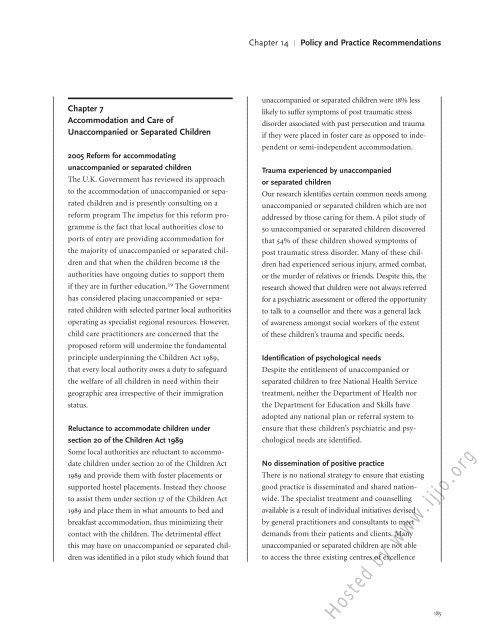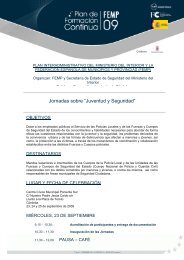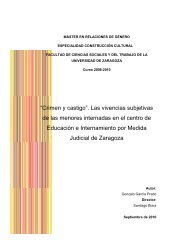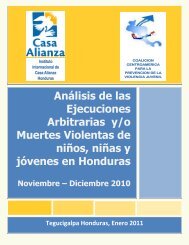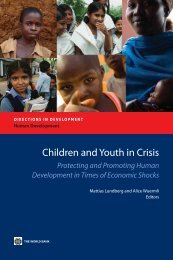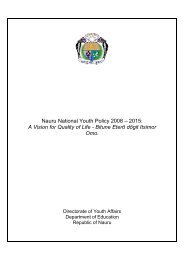Hosted by www.ijjo.org
Hosted by www.ijjo.org
Hosted by www.ijjo.org
You also want an ePaper? Increase the reach of your titles
YUMPU automatically turns print PDFs into web optimized ePapers that Google loves.
Chapter 14 | Policy and Practice Recommendations<br />
Chapter 7<br />
Accommodation and Care of<br />
Unaccompanied or Separated Children<br />
2005 Reform for accommodating<br />
unaccompanied or separated children<br />
The U.K. Government has reviewed its approach<br />
to the accommodation of unaccompanied or separated<br />
children and is presently consulting on a<br />
reform program The impetus for this reform programme<br />
is the fact that local authorities close to<br />
ports of entry are providing accommodation for<br />
the majority of unaccompanied or separated children<br />
and that when the children become 18 the<br />
authorities have ongoing duties to support them<br />
if they are in further education. 19 The Government<br />
has considered placing unaccompanied or separated<br />
children with selected partner local authorities<br />
operating as specialist regional resources. However,<br />
child care practitioners are concerned that the<br />
proposed reform will undermine the fundamental<br />
principle underpinning the Children Act 1989,<br />
that every local authority owes a duty to safeguard<br />
the welfare of all children in need within their<br />
geographic area irrespective of their immigration<br />
status.<br />
Reluctance to accommodate children under<br />
section 20 of the Children Act 1989<br />
Some local authorities are reluctant to accommodate<br />
children under section 20 of the Children Act<br />
1989 and provide them with foster placements or<br />
supported hostel placements. Instead they choose<br />
to assist them under section 17 of the Children Act<br />
1989 and place them in what amounts to bed and<br />
breakfast accommodation, thus minimizing their<br />
contact with the children. The detrimental effect<br />
this may have on unaccompanied or separated children<br />
was identified in a pilot study which found that<br />
unaccompanied or separated children were 18% less<br />
likely to suffer symptoms of post traumatic stress<br />
disorder associated with past persecution and trauma<br />
if they were placed in foster care as opposed to independent<br />
or semi-independent accommodation.<br />
Trauma experienced <strong>by</strong> unaccompanied<br />
or separated children<br />
Our research identifies certain common needs among<br />
unaccompanied or separated children which are not<br />
addressed <strong>by</strong> those caring for them. A pilot study of<br />
50 unaccompanied or separated children discovered<br />
that 54% of these children showed symptoms of<br />
post traumatic stress disorder. Many of these children<br />
had experienced serious injury, armed combat,<br />
or the murder of relatives or friends. Despite this, the<br />
research showed that children were not always referred<br />
for a psychiatric assessment or offered the opportunity<br />
to talk to a counsellor and there was a general lack<br />
of awareness amongst social workers of the extent<br />
of these children’s trauma and specific needs.<br />
Identification of psychological needs<br />
Despite the entitlement of unaccompanied or<br />
separated children to free National Health Service<br />
treatment, neither the Department of Health nor<br />
the Department for Education and Skills have<br />
adopted any national plan or referral system to<br />
ensure that these children’s psychiatric and psychological<br />
needs are identified.<br />
No dissemination of positive practice<br />
There is no national strategy to ensure that existing<br />
good practice is disseminated and shared nationwide.<br />
The specialist treatment and counselling<br />
available is a result of individual initiatives devised<br />
<strong>by</strong> general practitioners and consultants to meet<br />
demands from their patients and clients. Many<br />
unaccompanied or separated children are not able<br />
to access the three existing centres of excellence<br />
<strong>Hosted</strong> <strong>by</strong> <strong>www</strong>.<strong>ijjo</strong>.<strong>org</strong><br />
185


